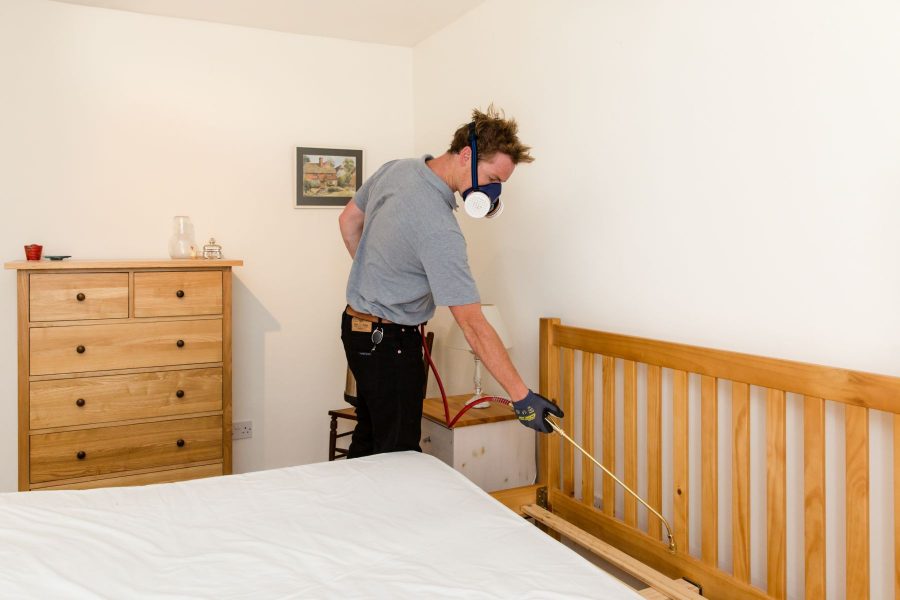Specialist Kings Bug Control Services Cincinnati OH
Kinds Of Parasite Control: Which Method Is Right for Your Invasion?
When confronted with a bug infestation, the choice of a suitable method for insect control is vital in effectively handling the situation. From chemical therapies to biological remedies, there exists an array of techniques that can be utilized to deal with various kinds of parasites. Each method comes with its very own collection of considerations and benefits, making the decision-making process a nuanced one. Recognizing the nuances of each method and evaluating their compatibility with the certain insect invasion available is essential for accomplishing lasting success in bug monitoring. By checking out the various kinds of parasite control approaches readily available, people can make informed decisions customized to their special situations, ensuring a more sustainable and efficient result in parasite removal.
Chemical Parasite Control
Chemical pest control entails making use of synthetic or normally acquired chemicals to take care of and eradicate pest populations efficiently. This technique is commonly used in agriculture, forestry, and property settings to combat a large array of parasites, consisting of weeds, rodents, and pests. The use of chemical pesticides can give quick and targeted options to pest invasions, making it a preferred selection for lots of people and services.
Among the essential advantages of chemical parasite control is its capability to quickly eliminate parasites, minimizing the danger of damage to crops, property, and human health and wellness. By utilizing particular chemicals that target specific pests, this technique can properly regulate infestations while lessening damage to useful organisms and the setting when used properly.
Nonetheless, making use of chemical pest control additionally increases issues concerning prospective negative impacts on non-target species, water sources, and human wellness. It is critical to comply with safety guidelines, use chemicals responsibly, and consider alternative bug control approaches to reduce these dangers and ensure lasting insect administration methods.
Biological Insect Control
Organic insect control, likewise known as biocontrol, makes use of living microorganisms to take care of and minimize parasite populaces naturally. This method utilizes the power of nature to manage pests without the need for artificial chemicals. Biocontrol can entail the introduction of natural opponents of the parasite varieties, such as bloodsuckers, microorganisms, or predators, to subdue insect populaces. By utilizing the insect's natural killers or virus, organic parasite control provides a sustainable and ecologically pleasant solution to pest administration.

Mechanical Insect Control
Utilizing hands-on and physical approaches to manage pest populaces, mechanical parasite control uses an alternative technique that does not count on making use of living microorganisms or artificial chemicals. This method includes making use of obstacles, traps, or other gadgets to literally deter or remove parasites. By blocking insect access factors or establishing traps to capture them, mechanical bug control can effectively reduce invasions without presenting chemicals right into the environment.
One common example of mechanical pest control is using mesh screens on doors and windows to avoid bugs from entering structures. This simple yet reliable technique serves as a physical obstacle, keeping bugs out while enabling for correct air flow. Additionally, devices like mousetraps, fly swatters, and ultrasonic repellents drop under the mechanical pest control category.
While mechanical pest control techniques can be labor-intensive and require regular tracking and maintenance, they provide a sustainable and ecologically pleasant solution for managing insect invasions. By incorporating various mechanical techniques, building owners can produce a comprehensive insect control approach that minimizes reliance on chemical pesticides.
Physical Insect Control

Some common physical parasite control Kings pest control services Cincinnati oh techniques consist of using barriers such as screens or internet to avoid parasite entry, traps to catch and get rid of parasites, and hand-picking to physically eliminate insects from plants or frameworks. Additionally, strategies like warmth therapies can be made use of to control insects like bed bugs by increasing the temperature to degrees that are lethal to the pests.
Physical insect control is specifically useful in integrated pest management (IPM) strategies, where several insect control techniques are combined for effective bug administration while decreasing the usage of chemicals. By using physical insect control strategies, individuals can successfully address insect infestations with very little environmental impact.
Integrated Bug Monitoring
When executing physical parasite control methods as part of pest administration methods, Integrated Insect Administration (IPM) emerges as a detailed technique that leverages numerous methods to effectively regulate pest populations. IPM concentrates on lasting prevention of bugs through a combination of organic, cultural, physical, and chemical devices customized to specific bug problems. By integrating multiple control strategies, IPM aims to minimize the risks connected with bugs while likewise minimizing dependence on chemical options.
One key aspect of IPM is the emphasis on surveillance and analyzing pest populaces to figure out the most ideal control techniques. This aggressive technique enables early treatment and targeted methods, leading to extra reliable pest management. Additionally, IPM promotes ecologically friendly techniques by prioritizing non-chemical control approaches and only using chemicals as a last resort.
Verdict

By making use of the parasite's all-natural predators or pathogens, biological parasite control supplies a lasting and ecologically pleasant solution to pest monitoring. - Kings exterminator cincinnati
Utilizing physical and hand-operated methods to manage parasite populations, mechanical parasite control offers an alternate strategy that does not count on the usage of living microorganisms or artificial chemicals.A reliable method to handling insect populaces without counting on chemical or organic approaches includes the use of physical pest control techniques.When applying physical insect control methods as component of insect monitoring approaches, Integrated Parasite Monitoring (IPM) emerges as a detailed technique that leverages numerous strategies to properly regulate pest populaces. Chemical insect control involves the use of pesticides, biological pest control uses natural killers, mechanical insect control includes physical obstacles, physical pest control consists of trapping or eliminating parasites, and incorporated parasite monitoring combines multiple techniques for a holistic method to pest control.